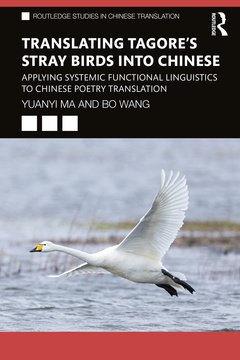Translating Tagore's Stray Birds into Chinese Applying Systemic Functional Linguistics to Chinese Poetry Translation Routledge Studies in Chinese Translation Series
Auteurs : Ma Yuanyi, Wang Bo

Translating Tagore?s ?Stray Birds? into Chinese explores the choices in poetry translation in light of Systemic Functional Linguistics (SFL) and illustrates the ways in which readers can achieve a deeper understanding of translated works in English and Chinese.
Focusing on Rabindranath Tagore?s ?Stray Birds?, a collection of elegant and philosophical poems, as a source text, Ma and Wang analyse four Chinese target texts by Zheng Zhenduo, Yao Hua, Lu Jinde and Feng Tang and consider their linguistic complexities through SFL. This book analyses the source text and the target texts from the perspectives of the four strata of language, including graphology, phonology, lexicogrammar and context.
Ideal for researchers and academics of SFL, Translation Studies, Linguistics, and Discourse Analysis, Translating Tagore?s ?Stray Birds? into Chinese provides an in-depth exploration of SFL and its emerging prominence in the field of Translation Studies.
Contents
Foreword
Figures
Tables
Abbreviations and Symbols
Abbreviations for Interlinear Glossing
Acknowledgements
Preface
Chapter 1 Delineating the specificity of poetry translation
1.1 Understanding poetry
1.2 Translators’ perspectives on poetry translation
1.3 A survey of recent studies on poetry translation
Chapter 2 Demystifying translation as recreation of meaning through choice
2.1 Matthiessen’s conceptualization of translation
2.2 Stray Birds and its four Chinese translations
2.3 Analytical framework and data size
Chapter 3 Translation on the expression plane of language: Graphological and phonological choices
3.1 Analysis of graphological choices
3.2 Analysis of phonological choices
3.3 Summary
Chapter 4 Translation on the content plane of language: Lexicogrammatical choices
4.1 Analysis of Theme
4.2 Theme shift
4.3 Analysis of process type
4.4 Process type shift
4.5 Summary
Chapter 5 Contextual considerations in translation: Analyzing field, tenor, and mode
5.1 Contextual analysis of field
5.2 Contextual analysis of tenor
5.3 Contextual analysis of mode
5.4 Contextual analysis and translation shifts
5.5 Summary
Chapter 6 Conclusion: Exploring poetry translation with Systemic Functional Linguistics
6.1 Significance of the study
6.2 Future directions
References
Index
Yuanyi Ma and Bo Wang received their doctoral degrees from the Hong Kong Polytechnic University. Their research interests include Systemic Functional Linguistics, translation studies, discourse analysis and language description. They are co-authors of Lao She’s Teahouse and Its Two English Translations: Exploring Chinese Drama Translation with Systemic Functional Linguistics (Routledge), Systemic Functional Translation Studies: Theoretical Insights and New Directions (Equinox) and Systemic Functional Insights on Language and Linguistics (Springer). Bo Wang is currently Associate Research Fellow from School of International Studies, Sun Yat-sen University, China. Yuanyi Ma is Lecturer from Guangdong Polytechnic of Science and Technology, China.
Date de parution : 12-2020
15.6x23.4 cm
Date de parution : 12-2020
15.6x23.4 cm
Thèmes de Translating Tagore's Stray Birds into Chinese :
Mots-clés :
Translation Shifts; Zheng Zhenduo; Chinese poetry translation; TTs; Expression plane of language; Tagore’s Poems; Poetry translation; Expression Plane; Systemic functional linguistics; Free Clauses; Rabindranath Tagore's Stray Birds; Process Type; Chinese Classical Poetry; Graphological Analysis; Clause Complex; Translation Studies; Rabindranath Tagore; Interpersonal Theme; Phonological Choices; Topical Themes; Rain Drop; Flying Bird; Yellow Leaves; Logico Semantic Relations; WoS Database; Textual Themes; Xu Zhimo; SFL Perspective; Layout Patterns



